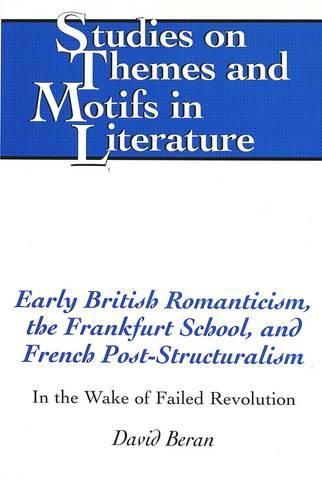Readings Newsletter
Become a Readings Member to make your shopping experience even easier.
Sign in or sign up for free!
You’re not far away from qualifying for FREE standard shipping within Australia
You’ve qualified for FREE standard shipping within Australia
The cart is loading…






Early British Romanticism, the Frankfurt School, and French Post-Structuralism examines the topics of the Enlightenment - the failure of revolution, the critique of the Enlightenment, and the sublimation of the political into the aesthetic - as they pertain to the historical developments of early British Romanticism, the critical theory of the Frankfurt School, and French Post-Structuralism. Early British Romanticism as it developed in relationship to the French Revolution is introduced, then compared to the Frankfurt School as it arose in response to Communist revolution and French Post-Structuralism as it took shape in the 1960s. By establishing the early British Romantics’ relationship to the French Revolution as the paradigm for the subsequent discussions of the Frankfurt School and French Post-Structuralism, this book provides a perspective from which some of the similarities and points of intersection between these movements/schools-of-thought (in regard to the Enlightenment, failed revolution, aesthetic theory, etc.) can be seen more clearly.
$9.00 standard shipping within Australia
FREE standard shipping within Australia for orders over $100.00
Express & International shipping calculated at checkout
Early British Romanticism, the Frankfurt School, and French Post-Structuralism examines the topics of the Enlightenment - the failure of revolution, the critique of the Enlightenment, and the sublimation of the political into the aesthetic - as they pertain to the historical developments of early British Romanticism, the critical theory of the Frankfurt School, and French Post-Structuralism. Early British Romanticism as it developed in relationship to the French Revolution is introduced, then compared to the Frankfurt School as it arose in response to Communist revolution and French Post-Structuralism as it took shape in the 1960s. By establishing the early British Romantics’ relationship to the French Revolution as the paradigm for the subsequent discussions of the Frankfurt School and French Post-Structuralism, this book provides a perspective from which some of the similarities and points of intersection between these movements/schools-of-thought (in regard to the Enlightenment, failed revolution, aesthetic theory, etc.) can be seen more clearly.